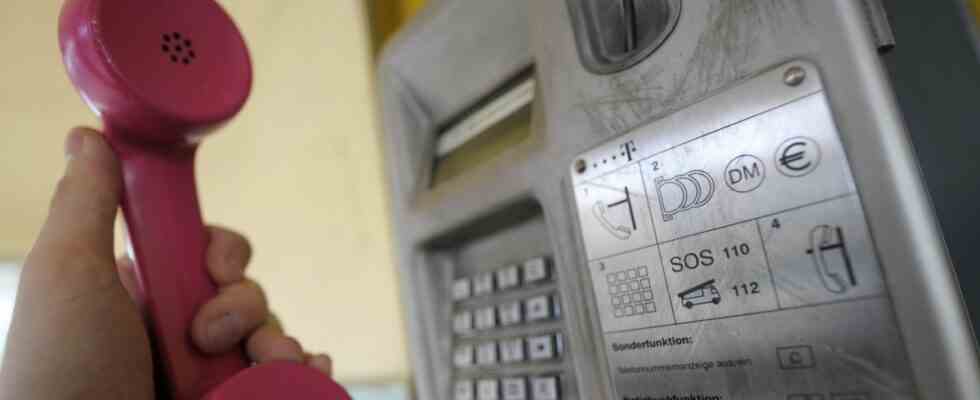So this time it’s really time. The coin slot will be deactivated this Monday in the 12,000 remaining Deutsche Telekom telephones. Then it’s over with the clack-clack, which either transported you to foreign worlds or connected you from there to your homeland.
The coin slot, that was a science. Because through the cracks into which one frantically threw one’s coins for decades, it usually rushed through without any consequences. Someone spread the rumor that rubbing coins could prevent this debacle, which is why rubbing marks were found all over public payphones and their cells. Yes, there has been so much rubbing over the years that in some areas of the gray apparatus or the yellow box the paint was off down to the metal layer. This did not make the small change easier to hold. So it had to be taken out from below and thrown in again at the top. Until someone opened the door and asked, “Are you going to be long?”
Most recently, old telephone booths, like the example shown here in Unterhaching imported from England, functioned as book collection points.
(Photo: Claus Schunk)
Now the coiners are deactivated. At the end of January, the end of phone card payments should also be sealed. All telephone booths and pillars in Germany will be dismantled or converted into a kind of cell phone repeater. After 142 years, the history of the public telephone in Germany ends, largely silently. Recently, some of the cells that had already been cleared had rotted away as wretched disposal sites for books that had never been read.
In the mid-1990s, there were still 160,000 such telephones in Germany. But at that time even Steve Jobs was still attached to the coiled cable and when they heard “telephone booth” everyone thought of Tippi Hedren, how she got to safety from Hitchcock’s birds. Now it’s finally over. The “obligation to operate public telephones” had already been removed from the Telecommunications Act in Germany at the end of 2021.
In Michendorf in Brandenburg, discarded telephone boxes are collected and broken down into their individual parts.
(Photo: Ralf Hirschberger/dpa)
But there may be a bit of melancholy when you think back to the heyday of clack-clack on this occasion. Because that was always heard when the money was used up during the phone call and the line – possibly forever? – was interrupted. Then you had to load new coins into the slider. The people who, by the way, had explained the art of rubbing to you were also the ones who stubbornly assured you that you could outsmart the Deutsche Post with buttons or worthless foreign European currency. That would be a lot cheaper. But you never tried. Because that would have been a bad omen for the voice message you were trying to please your boyfriend or girlfriend with. Except that the voice message was still a dialogue back then. Even rain, cold, the smell of cigarettes, urine and sweat, as well as the sight of politically or sexually connoted graffiti were accepted for this fine acoustic contact far away from the fixed network controlled by parents. Because as soon as a coin was successfully inserted and the longed-for person answered at the other end of the line, happiness was infinitely great.
So let’s bow to the clack-clack one last time and rub the coin again. It’s no good anyway.

